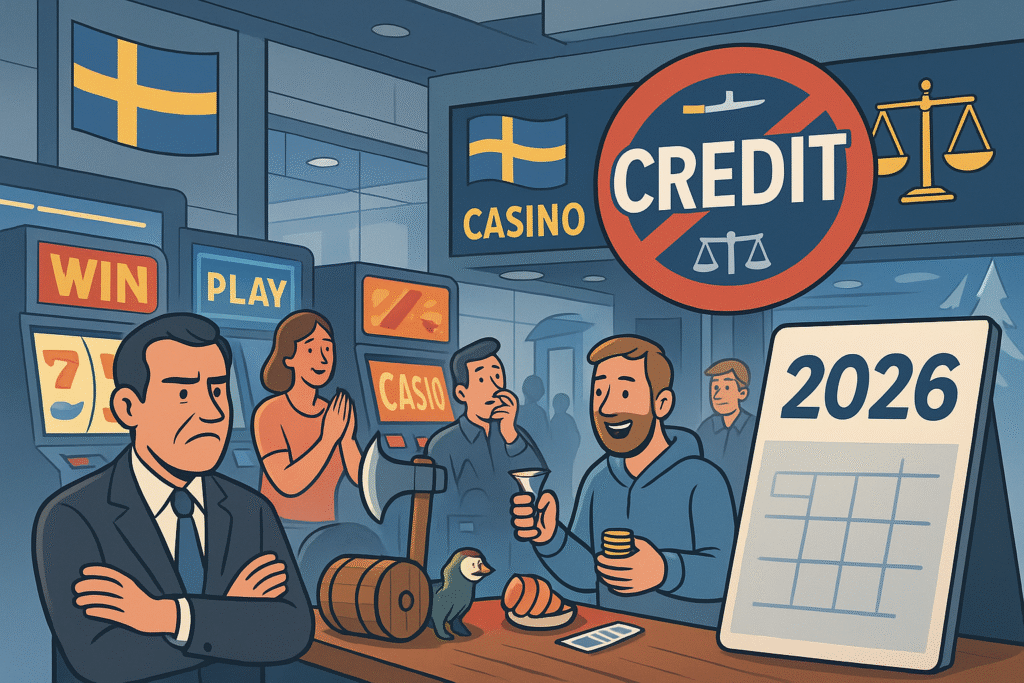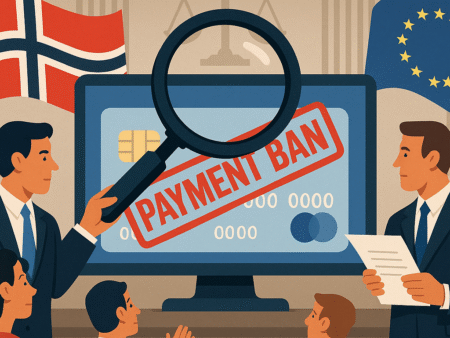
Big changes are brewing in the gambling world of Sweden. After years of arguments about keeping players safe, the government plans to roll out a stronger Sweden gambling credit ban in April 2026.
This huge move will do more than just change how people pay to play. It’ll push gambling companies to rethink their products, bonuses and payment systems too.So what’s behind new law, and what does it mean for folks who like to gamble and for those running the show? Here’s a look at where things stand (and where they’re going in 2026).
Table of Contents
Background – Gambling and Credit in Sweden
Sweden shook up its gambling rules in 2019, letting private companies enter game under the watchful eye of Spelinspektionen.
Still, problems didn’t go away
- Players ran up debt using credit cards.
- Fast payday loans (sky-high interest rates, by the way) were fueling long gambling sessions.
- Consumer groups shouted out loud: gambling should be with extra money, not borrowed cash.
So in 2023, the government started sketching out stricter rules. Now comes the new Sweden gambling credit ban for 2026.
What the Expanded Credit Ban Covers
This new rule isn’t just a tweak. It changes pretty much everything:
- Credit Card Transactions
- No gambling operators-online or in person-can let people pay with a credit cards.
- Covers casinos, sports betting, poker, lotteries.
- Credit Intermediaries
- Lending companies, payday loan partners, “buy now, pay later” stuff-all banned from the mix.
- Indirect Credit
- Even if the operator doesn’t hand out loans themselves, they can get in trouble if their payment options make easy to play with borrowed money.
- Land-Based Enforcement
- Physical places like slot halls, bingo venues or any future land casinos must follow the gambling credit cards Sweden ban too.
Why Sweden Is Expanding the Credit Ban
Why now? It’s all about keeping people safe (that’s the message):
- Debt Prevention – Turns out players using credit racked up more gambling problems.
- Transparency – Credit payments blurred the lines, making it tough to know just how much you lose.
- International Alignment – Norway and the UK already have similar bans running.
The Sweden gambling credit ban aims to protect players and cut down on gambling-related harm.
Impacts on Players
1. Move to Debit and Bank Transfers
People will have to switch to bank transfers, debit cards or e-wallets. For some, that might feel a bit tight at first, but at least you’ll only gamble what’s in your pocket.
2. Slower Deposits for Some
Fast setups like Pay N Play (Trustly, for example) will still let you get going quickly. Folks who used credit cards for points or quick deposits? They’ll need to switch gears.
3. More Awareness of Spending
No more gambling on credit, so it’s easier to see real losses and keep eye on your budget.
Impacts on Operators
1. Payment Method Changes
Gambling companies need to update their systems-dump gambling credit cards Sweden options and make sure all middlemen follow rules.
2. Marketing Adjustments
No more bonus offers for credit deposits. Messaging will shift to highlight safe and steady gaming.
3. Compliance Costs
Getting new payment screening tools set up and teaching employees the ropes will cost up front.
Industry Reactions
- Supportive groups-consumer advocates and public health experts-like this change.
- Some operators worry about losing cash, especially from big spenders hooked on credit.
- Financial analysts watch from sidelines. They say this could steady market over time, even if things slow down for a bit.
Comparing Sweden’s Ban with Other Countries
- United Kingdom dropped a credit card gambling ban in 2020. Early data says it helps cut gambling harm.
- Norway? Already blocks most credit payments for gambling.
- Finland may copy Sweden’s approach soon.
Sweden’s gambling regulations now line up with what’s seen as best practice across Europe.
Responsible Gambling in 2026 and Beyond
The Sweden gambling credit ban steps into a bigger gameplan:
- Mandatory Spelpaus self-exclusion program
- Tighter ads rules by September 2025
- Spelinspektionen keeps an eye on payment systems nonstop
Stacked together, these changes want to put Sweden out front in responsible gambling Sweden.
What Operators Should Do to Prepare
- Check every payment option. Make sure credit cards or anything linked to the credit are gone.
- Build up KYC systems. Only allow deposits from real, verified, non-credit sources.
- Let players know what’s up. If people get upset, give them the facts.
- Promote safety-show that your brand cares and follows rules.
Outlook for the Swedish Gambling Market in 2026
Expect the ban to reduce problem gambling by stopping play fueled by debt.
- Push companies to invent better, safer payment systems.
- Boost trust in licensed operators while making shady unlicensed ones look less appealing.
- Strengthen public trust in licensed operators while making unlicensed operators less attractive.
Short-term revenues might dip, but by 2026 the market looks set to be healthier and easier on players.
Authors Conclusion
The Sweden gambling credit ban is an important point for how the country deals with gambling. By shutting out credit cards and loans, Sweden backs up the responsible gambling Sweden promise, matches world trends and looks to guard players.
Companies running games need to get ready-change their payment systems, rethink their ads and train up for new rules. For people who like to play, it might seem tough at first, but in end it should mean a safer and clearer way to gamble.











